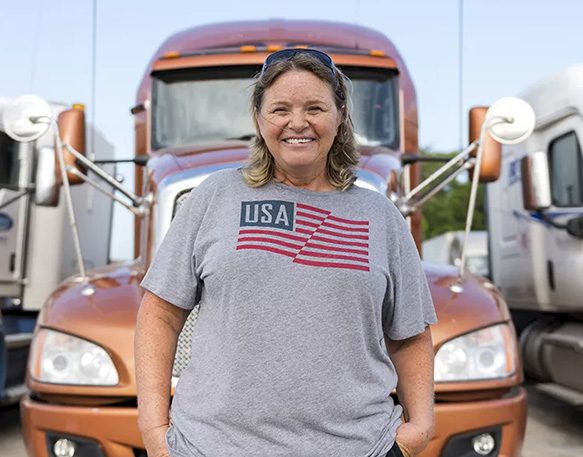Navigating Commercial Truck Insurance Costs Across States
Commercial truck insurance is essential, but commercial truck insurance rates by state may vary.
Operating commercial trucks naturally involves significant risks, ranging from accidents to cargo damage and theft, so commercial truck insurance is a must for all carriers. Without adequate insurance coverage, you may jeopardize all your business operations and financial stability.
Additionally, commercial truck insurance is a legal requirement in most jurisdictions. Regulatory bodies impose strict mandates on carriers to ensure they have sufficient insurance coverage to protect against liability from accidents or damages involving their trucks. However, commercial truck insurance costs and requirements may vary from state to state.
In this article, we’ll review commercial truck insurance rates by state, including state regulations, regional disparities, and cost reduction techniques, to help you understand the nuances of commercial truck insurance and make more informed decisions.
Navigating state regulations: Impact on insurance costs and coverage
If you plan on being a carrier, you need insurance — and you’re probably wondering how much it costs. Intrastate carriers may be subject to different minimum coverage limits, while interstate carriers will need to meet the FMCSA’s federal minimums, such as $300,000 in coverage for trucks that weigh less than 10,000 pounds and are transporting non-hazardous materials, $750,000 for trucks weighing more than 10,000 pounds and transporting non-hazardous materials, and $5,000,000 for trucks transporting hazardous materials. In short, there’s no one-size-fits-all answer.
Not only does each company have a different number of drivers and trucks on the road, but regulations vary from state to state. Even if you’re just one mile from your state’s border, you may be subject to vastly different insurance requirements and associated costs than someone on the other side.
For example, in Mississippi, the average local premium rate is $3,552, and the average national premium rate is $4,664. Meanwhile, if you had established your carrier business in neighboring Alabama, you would be looking at an average local premium rate of $10,284 and an average national premium rate of $14,216.
Some states have riskier roads that wear trucks down faster, which often means more strict insurance requirements and potentially higher rates. Since a higher population density or increased traffic congestion increases the risk of accidents, carriers in heavily populated cities or states may face higher insurance premiums.
What’s more, certain states require more frequent hazardous material transportation. For example, states with large industrial sectors or extensive manufacturing facilities often see more hazardous material shipments on the road. This increased risk of transporting hazardous materials can lead to stricter insurance requirements and higher premiums in these states.
Regardless of your state, you’ll need hazmat truck insurance coverage if you plan on hauling hazardous materials. This includes nine classes of hazardous materials: explosives, gases, flammable and combustible liquids, flammable solids that are dangerous when wet or may spontaneously combust, oxidizers and organic peroxides, poison and poison inhalation hazards, radioactive materials, corrosive materials, and miscellaneous hazardous materials.
Your credit score can also impact commercial truck insurance rates by state. Insurance companies offer those with higher credit scores lower rates because they are more likely to pay their premiums.
Even where you store your trucks can impact insurance. After all, trucks are generally safer when kept in a garage versus a parking lot. Since the risk of a truck being vandalized, stolen, or hit by another vehicle is much lower, you may have lower insurance rates if you keep your trucks in a garage. Moreover, when you park your truck in a garage, you won’t have to worry about falling branches, hail, and other damages that can occur when vehicles are left exposed outdoors. This added layer of protection not only reduces the risk of damage but also means insurers are more likely to provide competitive rates.
Analyzing regional disparities: Comparing insurance premiums across states
Commercial truck insurance rates by state are anything but uniform.
- Alabama: In Alabama, you can expect to pay an average rate of $10,284 for your local premium and $14,216 for your national premium.
- Alaska: If your carrier business is based in Alaska, you can expect to pay an average of $6,915 for the local premium commercial truck insurance rate or $9,326 for the national premium commercial truck insurance rate.
- Arizona: Arizona isn’t just home to the Grand Canyon. It’s also one of the states with low average local premium insurance rates. Carriers pay an average of $6,102 for local insurance and $11,797 for national insurance.
- Arkansas: In Arkansas, the average local premium rate is $10,973. The average national premium rate is quite a bit higher at $14,922.
- California: The Golden State has relatively high insurance rates. The average local premium rate is $11,834, while the average national premium rate is $14,041.
- Colorado: If you establish your carrier business in Colorado, you can expect a local premium of around $7,294 and a national premium of approximately $12,110.
- Connecticut: Connecticut has relatively high insurance premiums. The average local premium rate is $16,946, and the average national premium rate is $17,004.
- Delaware: Delaware has even higher insurance premiums. The average local rate is $17,351, while the average national rate is even higher at $19,670.
- Florida: In the Sunshine State, you can expect to pay around $12,872 for your local rate and $19,480 for your national rate.
- Georgia: Florida’s neighboring state of Georgia has even higher rates. The average local rate is $15,200, and the average national rate is $20,641.
- Hawaii: In Hawaii, you can expect to pay $10,000 to $30,000 a year for commercial truck insurance on a semi-truck.
- Idaho: If your carrier business is based in Idaho, you can expect an average local premium rate of $6,887 and an average national rate of $9,008.
- Illinois: Illinois’ average local premium rate is $7,704. However, its average national rate is much higher at $13,781.
- Indiana: With an average local rate of $8,430 and an average national rate of $11,141, Indiana falls somewhere in the middle.
- Iowa: Rates are quite low in Iowa. The average local premium rate is just $5,615, while the average national premium rate is $8,866.
- Kansas: In Kansas, the average local commercial truck insurance rate is $6,645, which is also relatively low. The average national premium rate is several thousand dollars higher at $10,160.
- Kentucky: Kentucky’s average local rate is $11,555, putting it on the higher end. Its average national commercial truck insurance premium rate is $15,500.
- Louisiana: With a $19,736 average local premium rate and a $20,255 average national premium rate for commercial truck insurance, Louisiana ranks among the most expensive states for truck insurance.
- Maine: If you base your carrier business in Maine, you can expect an average local premium rate of $9,535 and an average national premium rate of $13,763.
- Maryland: In Maryland, the average insurance premium rates are a little higher. The average local commercial truck insurance premium is $11,112, while the average national premium is $16,056.
- Massachusetts: Though Massachusetts is relatively densely populated and has a major city, the average local premium rate remains low at $5,447. However, the average national premium is significantly higher at $17,017.
- Michigan: When it comes to premium rates, Michigan is fairly middle of the road. The average local premium for commercial truck insurance is $8,910, and the average national rate is $13,793.
- Minnesota: Minnesota’s commercial truck insurance rates are pretty reasonable, with an average local premium rate of $9,669 and an average national premium rate of $12,820.
- Mississippi: With a $3,552 average local premium commercial truck insurance rate, Mississippi is the cheapest state for commercial truck insurance. Its average national premium rate is $4,664.
- Missouri: In Missouri, you can expect an average local premium rate of $7,646 and an average national rate of $11,757.
- Montana: If you establish your carrier business in Montana, you can save some money, as the insurance premiums are relatively low. The average local premium rate is just $6,501, and the average national premium is $9,492.
- Nebraska: Nebraska has even cheaper insurance rates. The average local premium is $6,259, while the average national premium is $8,664.
- Nevada: In Nevada, the average local premium for commercial truck insurance is $10,681, while the average national premium is $16,912.
- New Hampshire: You can expect to pay around $6,817 for your local commercial truck insurance premium and $11,390 for your national premium.
- New Jersey: New Jersey-based carriers will likely face high insurance premiums, as the average local insurance premium is $20,763, and the average national premium rate is only a little lower at $20,255.
- New Mexico: If you’re based in New Mexico, you can expect an average local insurance premium of $7,298 and an average national premium rate of $9,738.
- New York: Not only is the Empire State one of the most densely populated states in the country, but it can also have cold, icy winters. So, it’s hardly surprising that insurance premiums are relatively high. Local insurance premiums average at $16,949, and the national insurance premium rate is $17,585.
- North Carolina: In North Carolina, rates are much lower. The average premium for local insurance is $7,450, while the average national premium rate is $10,630.
- North Dakota: North Dakota has relatively low insurance rates. You can expect to pay $6,456 for your local premium rate and $9,206 for your national premium rate.
- Ohio: Ohio is a little more expensive. The average local premium rate is $7,094, while the average national premium rate is $9,933.
- Oklahoma: In Oklahoma, you can expect to pay $9,376 on average for your local insurance premium and $13,383 for your national premium.
- Oregon: With an average local premium rate of $8,484 and an average national premium rate of $11,272, Oregon’s insurance rates are around average.
- Pennsylvania: Pennsylvania’s average local premium rate is lower than Oregon’s, but its average national premium rate is a little higher. You can expect to pay around $7,536 for your local premium and $12,470 for your national premium in Pennsylvania.
- Rhode Island: If you set up your carrier business in Rhode Island, you can expect higher than average insurance premiums. The average local premium rate is $14,046, and the average national premium rate for commercial truck insurance is even higher at $17,220.
- South Carolina: South Carolina has an average local commercial truck insurance premium rate of $9,390 and an average national premium rate of $13,376.
- South Dakota: South Dakota’s average commercial truck insurance is more affordable at an average of $6,689 for local premium rates and an average of $9,013 for national premium rates.
- Tennessee: With an average local premium rate of $9,592 and an average national premium of $13,773, Tennessee’s commercial truck premium rates are significantly higher than South Dakota’s.
- Texas: The Lone Star State has an average local premium rate of $10,533 and an average national premium rate of $14,497 for commercial truck insurance.
- Utah: If you establish your carrier business in Utah, you can expect an average local commercial truck insurance premium rate of $9,121 and an average national premium rate of $11,110.
- Vermont: Vermont’s commercial truck insurance rates are lower. The average local premium rate is $6,937, while the average national premium rate is $9,643.
- Virginia: In Virginia, the average local premium rate for commercial truck insurance is $9,957. The average national rate is higher at $13,119.
- Washington: With an $8,484 average local premium rate and a $12,706 average national premium rate, Washington is solidly in the middle of the road when it comes to insurance premium costs.
- West Virginia: West Virginia’s average local premium rate is $11,687, while the average national premium is even higher at $14,638.
- Wisconsin: If your carrier business is based in Wisconsin, you can expect cheaper rates than if you operated out of West Virginia. The average local premium rate is $6,714, while the average national premium is $9,231.
- Wyoming: Wyoming’s average local premium commercial truck insurance rate is $4,927, earning it a place as the second cheapest state for commercial truck insurance. Its average national premium rate is $7,149.
You may even notice differences in trucking insurance costs within a state. If your carrier business is based in a high-risk zip code, such as in a major city or an area that regularly experiences severe weather, you can expect to pay a higher insurance premium.
Effective cost reduction tactics: Implementing risk mitigation and safety practices
Since every accident you’re involved in can significantly drive up your insurance premium and potentially put your carrier business in a tricky spot, you must proactively manage risks to maintain financial stability and set your business up for long-term success.
You’ll want to invest in comprehensive driver training programs. Properly trained drivers are not only able to practice defensive driving techniques, adhere to traffic laws, and follow proper cargo handling procedures, but they are also less likely to engage in risky behaviors that could cause accidents and subsequent insurance premium hikes. Additionally, having driver training programs can help create a safety-conscious culture within your business, where employees at every level understand and respect safety protocols.
It’s also a good idea to implement stringent maintenance protocols for every truck in your fleet. This means conducting regular inspections and making any necessary repairs in a timely fashion. Not only is this vital for ensuring regulatory compliance, but it can also help reduce your risk of experiencing mechanical failures that might lead to accidents. Additionally, you’ll want to conduct pre-trip vehicle inspections to minimize the likelihood of unexpected breakdowns and associated insurance claims.
You can also use advanced telematics technology to gain real-time insights into drivers’ behavior and vehicle performance. For example, you can monitor everything from speed to braking patterns from afar, enabling you to identify areas for improvement. You can even get ahead of potential issues and take action before they escalate.
Lastly, read about regulatory changes and industry trends. By staying ahead of emerging risks and adapting policies and procedures accordingly, you can proactively mitigate potential liabilities and ensure your carrier business remains compliant.




